Transferts monétaires et mobilité humaine
Les transferts monétaires sont souvent utilisés lors de crises afin de répondre aux besoins des personnes migrantes. Dans cette page, vous trouverez des ressources sur les transferts monétaires et la migration.

La Croix-Rouge se prépare à fournir une aide humanitaire aux migrant·es de la caravane sur le point de quitter le Honduras pour le Guatemala.
©Johannes Chinchilla / FICR.
Conflits, crises économiques et catastrophes sont autant de raisons ayant contraint des personnes à fuir et à traverser des frontières dans des conditions éprouvantes et risquées, en quête de sécurité et de moyens de subsistance. En 2020, le nombre de personnes déplacées de force s’est envolé au niveau sans précédent de plus de 80 millions de personnes, soit près du double du nombre enregistré il y a une dizaine d’année. Cette tendance s’aggrave et les effets du changement climatique menacent de déplacer jusqu’à 200 millions de personnes d’ici 2050.
L’assistance monétaire est de plus en plus utilisée afin de répondre aux besoins des personnes en situation de déplacement. On y a eu recours à grande échelle dans différents contextes de migration, en Europe en 2015 jusqu’au Venezuela pour « los caminantes ». Elle a également été utilisée dans d’autres crises migratoires, notamment en Amérique centrale, au Sahel, en Méditerranée et dans la Corne de l’Afrique. L’assistance monétaire est à l’heure actuelle l’une des principales formes d’aide apportée aux populations déplacées en Ukraine et dans les pays voisins.
Il existe une myriade de perspectives et de définitions concernant le mot « migrant·e » et la façon dont les humanitaires doivent agir. C’est pourquoi nous ne choisissons pas une définition unique pour le moment, étant donné que les discussions sur l’assistance monétaire et la migration en sont encore à leurs prémices et que le langage évolue encore.
Documenter et partager les données probantes donnera lieu à des interventions plus efficaces. Cette page contient une sélection de ressources utiles concernant la migration et le recours à l’assistance monétaire. Elle sera mise à jour au fil des discussions ayant lieu dans les espaces humanitaires des transferts monétaires.
Priorités actuelles
Afin de contribuer aux progrès relatifs à cet enjeu, nous nous engageons à :
- soutenir la création de données probantes aux niveaux régional et mondial ;
- contribuer aux solutions pratiques visant à mettre en œuvre les transferts monétaires auprès des personnes migrantes ;
- organiser des discussions sur les enjeux majeurs basées sur des données probantes.
Contenu récent

COVID-19 and the Emergency Social Safety Net (ESSN) and Conditional Cash Transfers for Education (CCTE) programmes
Guidelines and Tools
FCDO Turkey commissioned SPACE to assess the impact of COVID-19 on the principal cash vehicles active in Turkey: Emergency Social Safety Net (ESSN) and Conditional Cash Transfers for Education (CCTE) programmes, both funded by the EU through the EUR 6 billion Facility for Refugees in Turkey (FRiT)...

Inclusive Information Systems for Social Protection: Intentionally Integrating Gender and Disability
Policy paper
Digital information systems serving the social protection sector, and especially social assistance, are increasingly prominent and will continue to be, as is the case within all other sectors. “Why? Because the ability of a country to care for its people and respond to their lifecycle needs depends on...
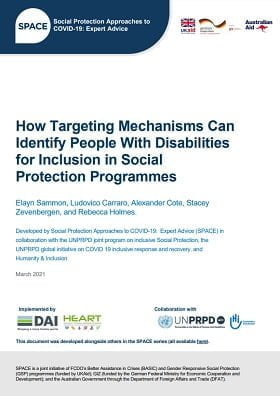
How Targeting Mechanisms Can Identify People With Disabilities for Inclusion in Social Protection Programmes
Guidelines and Tools
Persons with disabilities have worse education, health and employment outcomes and are more vulnerable to shocks than persons without disabilities. At the same time, they are less likely to be enrolled in social protection programmes, including those for which they are eligible. They can face significant...

Data simplified. Protection amplified. An essential conversation for CVA practitioners.
Webinar recording
As humanitarian aid becomes increasingly remote and digitized in the pandemic, and data is both a commodity and a weapon, how do we protect those we aim to help? More than ever, data must be treated as an extension of the individual and as an essential part of humanitarian protection. the CALP...

Étude de cas : Partage responsable des données avec les gouvernements
Rapport
Ce document étudie diverses stratégies que les acteurs des transferts monétaires peuvent mettre en oeuvre pour atténuer les préjudices réels et potentiels auxquels le partage de données sur les bénéficiaires de transferts monétaires avec les gouvernements pourrait exposer les populations...

Étude de cas : gestion responsable des données et ciblage numérique à distance pendant la Covid-19
Rapport
La pandémie de COVID-19 a éclaté début 2020 et a mis le monde sens dessus dessous. Fin 2020, l’OMS recensait quelque 75 millions de cas confirmés à travers le monde et 1,7 million de décès1. Contrairement à une crise « normale », la pandémie est mondiale par nature, touchant chaque pays à...
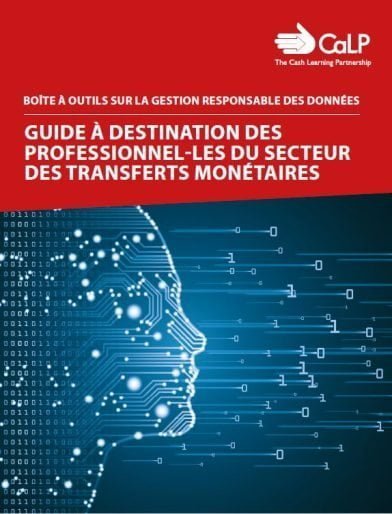
Boîte à outils sur la gestion responsable des données : Guide à destination des professionnel-les du secteur des transferts monétaires
Rapport
En 2016, ELAN a créé le 2016 Data Starter Kit, l’une des premières boîtes à outils consacrées à la gestion responsable des données dans les secteurs humanitaire et du développement. Le Data Starter Kit est une ressource centrale pour la communauté CaLP et plus généralement pour les...
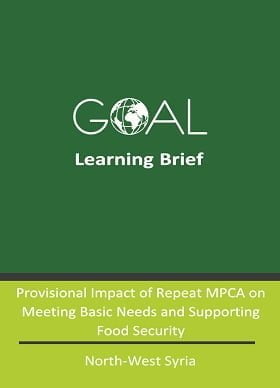
Provisional Impact of Repeat MPCA on Meeting Basic Needs and Supporting Food Security in North-West Syria
Policy paper
In the North-West Syria response, cash assistance is mostly once-off or else for a maximum of 3 months. GOAL Syria is delivering a large-scale value voucher or food kit response to support food security needs. However, needs assessment repeatedly show that households have high non-food needs along with...

Brief: Towards shock-responsive social protection: lessons from the COVID-19 response in Ethiopia
Policy paper
COVID-19 and national and international measures to curb its spread, may have pushed 15 million more people below the poverty line in Ethiopia. This policy brief draws on key learnings from the Ethiopia country case study, focused on the social protection response to COVID-19 and identifies...
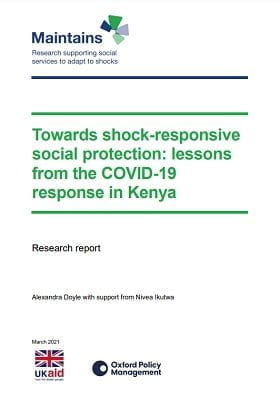
Towards shock-responsive social protection: lessons from the COVID-19 response in Kenya
Report
The stringent lockdown measures and global economic slowdown, due to COVID-19, are likely to push more than 2 million people into poverty in Kenya. This study documents the Government of Kenya’s social protection response to mitigate the negative impact of the pandemic on vulnerable households and...

Towards shock-responsive social protection: lessons from the COVID-19 response in Pakistan
Report
The stringent lockdown measures and global economic slowdown, due to COVID-19, are likely to increase the poverty rate in Pakistan by 35 percentage points in urban areas and 32 percentage points in rural areas. The report documents the Government of Pakistan’s social protection response to mitigate the...

Brief: Towards shock-responsive social protection: lessons from the COVID-19 response in Pakistan
Policy paper
This policy brief draws on key learnings from the Pakistan research report and microsimulation report on the social protection responses to COVID-19. The brief provides analysis of the factors that enabled and constrained the effectiveness of the delivery of social protection in Pakistan and also provides...
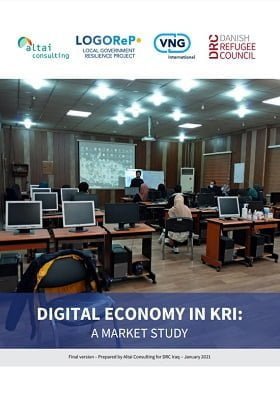
Digital economy in KRI: A market study
Report
The objective of the research was to assess the opportunities and challenges for digital technologies to promote economic growth and employment creation for host communities and refugees in Kurdistan Region of Iraq. The findings of this report will then be used to design curricula for digital skills which...

Évaluation formative de la Communauté de pratique sur les transferts sociaux monétaires en Afrique francophone (2014-2019)
Rapport
La Communauté de pratique (CoP) sur les transferts sociaux monétaires en Afrique a été lancée par la Banque Mondiale en 2011. À cette période, plusieurs pays d’Afrique de l’Est et australe s’appuyaient sur des données probantes issues d’évaluations d’impact pour déployer des programmes...

Soutenir les liens entre les transferts monétaires humanitaires et les systèmes nationaux de protection sociale
Rapport
Cette fiche-conseils vise à soutenir les efforts de coordination nationale afin de renforcer l’engagement entre les groupes de coordination humanitaire qui mettent en oeuvre les transferts monétaires (TM) et les acteurs et groupes de coordination existants en matière de protection sociale ou de...
The CALP Network Technical Advisory Group (TAG) Quarterly Meeting
Members event
This is the first TAG meeting of 2021. The TAG helps shape and steer the CALP Network’s technical and policy priorities within the overall strategic vision for the network, and is comprised of 20-30 individuals from member organisations.

Cash Hub Webinar 18: Cash and Data Protection – The Use of Cash & Markets in the Red Cross Red Crescent Movement
Members event
The webinar will focus on Cash and Voucher Assistance (CVA) & Data Protection. As we scale up our use of CVA, collecting and processing of personal data must also increase. Considering data protection is essential for protecting the vulnerable, building trust and implementing CVA safely and at scale....

Sudan – Gedaref Joint Cash Risk assessment
Report
Since the crisis in the Tigray region of Ethiopia in November 2020 over 60,000 people have sought refuge in neighbouring Sudan and were mostly accommodated in camps re-established in Gedaref State. Cash is has been utilised as a response modality and is being considered further by several agencies. This...

Linking the Rapid Response Mechanism to the Provision of Cash Assistance and Women’s Protection: UNFPA Yemen Case Study
Report
The rapid response mechanism (RRM) in Yemen aims to provide a minimum package of critical life-saving assistance for newly displaced persons. This is led by UNFPA in partnership with WFP and UNICEF. The RRM serves as an entry point for the provision of multi-purpose cash assistance and to address...

Demystifying the Minimum Expenditure Basket
Blog Post
Reflections from the CALP Network and WFP’s joint webinar series on MEBs.